In the following article that appeared in the Cumhuriyet newspaper on 27 May 2018, Mine Söğüt describes her experiences while accompanying Başak Demirtaş on the arduous journey she makes every week to visit her husband, former HDP co-chair and the party's presidential candidate, Selahattin, in Edirne Prison 1700 kilometres away. Translated from Turkish by Tim Drayton
Başak Demirtaş: This is a good trek
For twenty months, she has set out on a long journey from their home in Diyarbakır every Wednesday. With patience, perseverance and faith to enable her to see her husband Selahattin Demirtaş in Edirne Prison and spend a mere hour with him. This story is the story of this long day trip. And, at the same time, of patience, perseverance and faith. And it is also love’s non-political and exceptionally human story.By Mine Söğüt
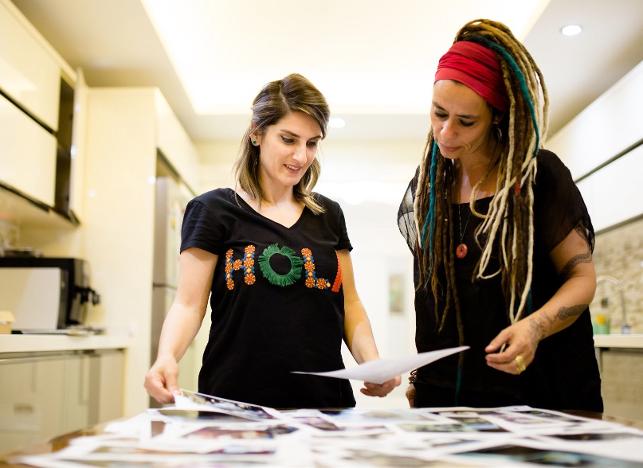
Başak posted a Tweet and asked people to send the best photographs they have taken of the election campaign. We have fun looking at them. They say, “What a lovely smile she’s got, hasn’t she?“ The “Hola“ on her T-shirt is Zaza for ”Im well.“
00.30 ACQUAINTANCE
It is half past midnight. We are on the expansive balcony of a flat on the top floor of a multistorey apartment building in one of the new quarters of Diyarbakır surrounded by wide streets that in no way resembles those venerable quarters crammed in among narrow roads.
There is a full moon. It is a glittering night. We are drinking tea and looking at the dried flowers hanging on the wall. These are the flowers that Selahattin Demirtaş has sent from the inside. They stand upside down and, dry as they may be, still maintain the magic of their colours.
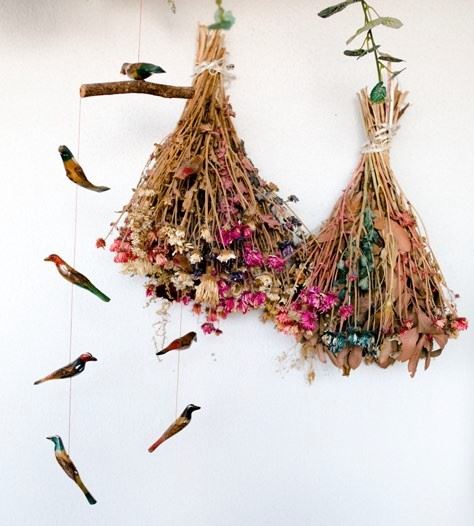
They have dried the flowers he has sent from prison and hung them on the wall.
Twenty months, I say. She says, Twenty months.
We fall silent. We look at the moon. We each take another sip of tea. We have only just become acquainted. We are here to accompany her on the journey she makes regularly every week to Edirne for a prison visit. We have called in for an evening tea to get acquainted one day early.
I inquire, “How early can we call by in the morning to get footage of you leaving home?”
“Oh, stay here,” she says, “It’ll be easier.”
We have only just become acquainted; we are as yet unaware that by this time tomorrow we would return as two friends who had made a monstrous journey, had shared many things with one another and had probably had different experiences but had at the same time become closer to one another in many ways.
A few minutes after having said, out of politeness, “How can we do that?” three beds are unfolded in the flat. One for me, one for my colleague Vedat who is to take the photographs and one for my colleague Berna who is to shoot the video.
06.30 GETTING UP IN THE MORNING
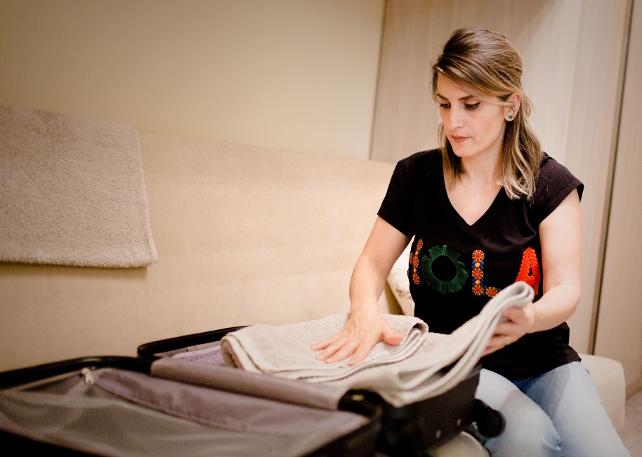
This suitcase is carefully packed every week. Clean underwear, clothing and towels inside. She says, “He actually also washes his own laundry. But, it gives me solace to bring some things belonging to him home every week and to bring him something from home.”
The sun has long since risen. Outside there is the cool of light rain. The suitcase in which she put the clean towels and T-shirts last night stands in the corridor. The kids are asleep inside. Başak is curling her hair in the bathroom. And she tells me how she met Selahattin Demirtaş, how they got married, how they have been devoted to one another since the first day of their marriage, how they have spent sixteen years together and how things have ended up as they have. By now, she is done with curling her hair and has moved on to make-up.
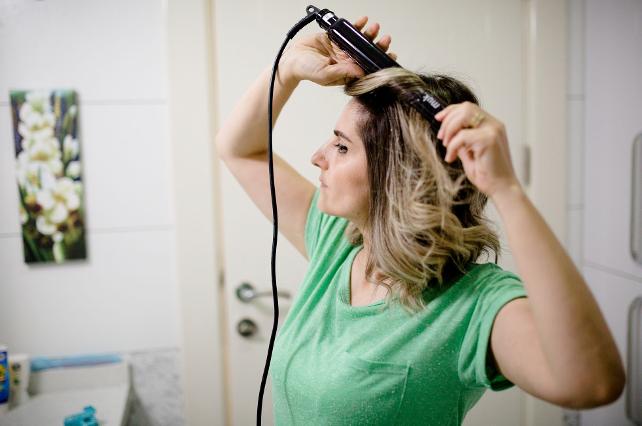
While curling her hair and readying herself to make the one hundredth prison visit to twenty-month-detainee Selahattin Demirtaş, she is as excited as when she was going to meet her husband of sixteen years for the first time.
“It is important for him always to see me well groomed,” she says, “Otherwise, he will be plagued with thoughts about whether we are all right and there is a problem.”
So, are they all right?
Yes, they are all right, because they know that what has befallen them is not a personal thing. The judiciary losing its independence, courts becoming dysfunctional and the failure so far for a politician who has been held in jail for months, since this is what those in power wish for, even though he is a presidential candidate is puzzling not only for them, but for the world.
The light radiating from her eyes as she says, “He cannot flee and had returned from abroad two days before he was detained. It is impossible for him to tamper with the evidence since all the evidence is the speeches he made and the articles he wrote. Everyone can clearly see this. Think, this is how scared they are of him,” is the light that comes from the sense of being indisputably right and thus strong.
She says this and, finally, carefully applies the lipstick.
We are now ready to set out.
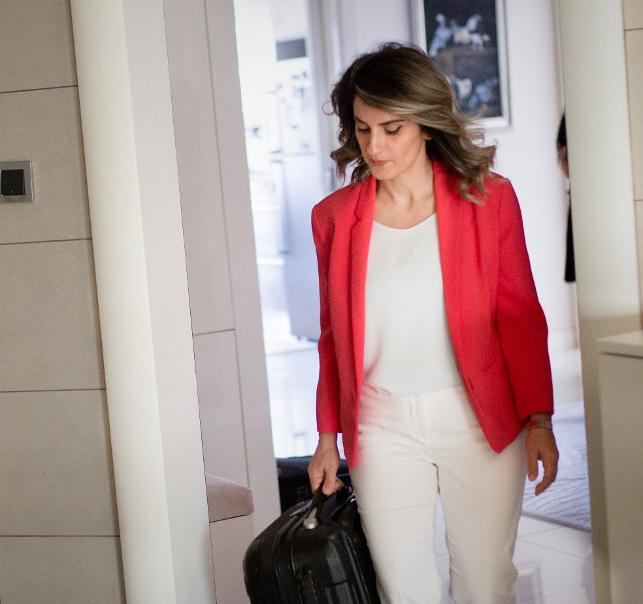
“They ask me how I can be so strong. People draw strength from being right. I am so happy when I hear his defences in courts. Not just we, but everyone, sees how right he is there.”
07.30 DEPARTURE
We head for Diyarbakır Airport. We are accompanied by Selahattin’s sister Bahar. She talks a bit about her brother, too. “Do you know I learnt how to iron from him?” she says.
I say, “Hum, yesterday evening your husband Harun made and brought our coffees? After all, south-eastern men are feudal(!)” and we share a laugh.
No, all the men in this family are egalitarian. Listening to Başak and Bahar, I begin to understand why the language in Selahattin Demirtaş’s speeches is not masculine. This makes it easier to understand how someone who denies the feudal tendencies that have plagued this part of the world entry to his home and life is capable of creating a discourse that is different from the customs and expectations of the society to which he belongs politically but nevertheless exerts influence on them.
“He has an aptitude for everything,” says Başak, “He writes well, paints pictures, writes poems, writes stories and has a keen sense of humour. He’s really a man of the arts, Selahattin; maybe that’s why hes a different politician. And he is good. He is a very good person.”
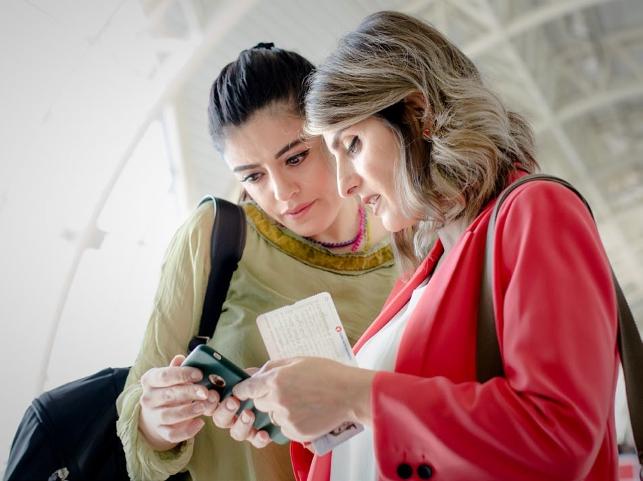
Başak tweets frequently to give news from prison on social media. Sometimes, she also posts her thoughts about him. “I am delighted to be a bridge between people,” she says, “They need this. They want to catch up with him in some way and get news from him.”
08.20 FLIGHT TO ISTANBUL
We are in the plane. Başak, Bahar and I are sitting next to one another. The plane that has taken off from Diyarbakır will land in Istanbul in about two hours. Başak dreams of getting a bit of sleep on the way. It is important not to look tired during the visit. “Its a long journey but this trek is a good trek,” she says. She closes her eyes now and again but opens them when something comes to mind. She describes how the visits happen.
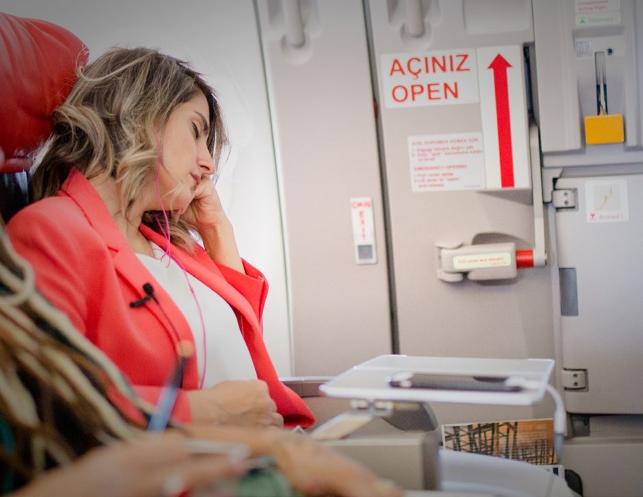
It is a long journey. On the plane, Başak from time to time puts on the headphones to rest and drifts into brief sleeps listening to music. The music on this journey is by Farid Farjad. She sometimes plays folk music and songs that Selahattin also likes and always has calm, happy, good dreams about the wonderful days in the future in those naps.
Every week she passes on bit by bit to Selahattin everything that is happening on the outside. He has open visitation rights once a month. The family attends en masse. Sometimes siblings, sometimes children, sometimes mothers and fathers. He also has closed visitation rights three times. They can speak on a phone looking one another in the face through a pane of glass among iron bars. Sometimes they stay in mutual silence. They just look at one another. One hour. It all lasts one hour.
Just as I was about to ask, “Let’s add it up. How many hours do you spend on the way one day a week, for that single hour?” I drop it at once. I sense from Başak’s occasional glances out of the plane’s window and the deep breaths she takes whenever she closes her eyes that some things do not come down to arithmetic. That one hour, for instance, is not one hour. That trek is not a trek, either. Even pain is sometimes not pain.
In fact, when a female passenger in her sixties approaches us on the plane, bends down slightly to Başak, gently asks, “A visit, isnt it?” and politely conveys her greetings, nothing is difficult any more.
Towels and clothing in the suitcase and the photographs to be given to the lawyers with the request that they be forwarded to him and bundles of greetings...
Başak is a tiny, slender woman; she has gladly embraced a gigantic responsibility without in the least feeling its weight and is carrying it from Diyarbakır to Edirne with pleasure, hope and pride.
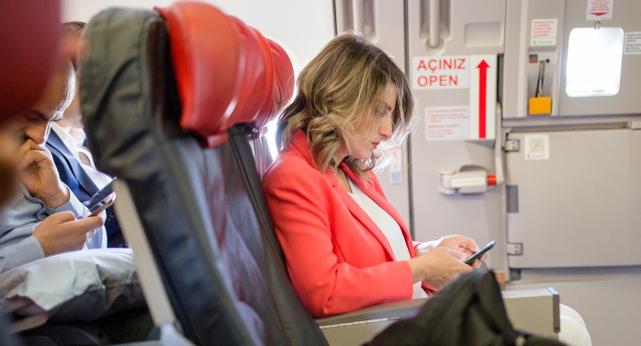
11.00 JOURNEY TO EDİRNE
We have reached Istanbul. We are now in the car. We have 250 kilometres of highway ahead of us. If there is no traffic or roadworks, a distance that takes over three hours under normal conditions. This is not an issue going, but we have to hurry greatly in the evening traffic to catch the return flight. We are lucky. The car has the right of way. So, it is possible to race against time.
With Başak talking about these things, the conversation suddenly turns to the difficulties of being a detainee’s relative. Başak explains that if her own problems are compared to the problems of other detainees’ relatives they are made to look trivial.
She says, “They punish families, too, by putting people in prisons so far from their homes.” She speaks of those with limited means being unable to come on visits. She tells the story of a mother who left her village with the last of her money and managed to get as far as the prison gate thousands of kilometres away and slept and spent her waking hours wrapped in a blanket at the prison gate without knowing when and how she would see her child.
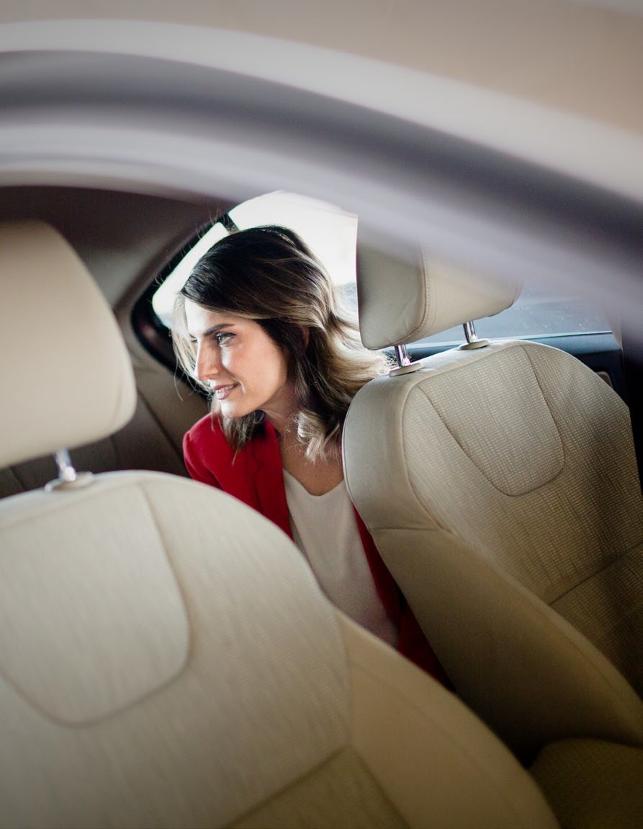
She says, People come on buses and collective taxis and, if they are very poor, by walking here from the bus station. It is impossible for them to get home on the same day. They dont have hotel money, either. This is why no relative of most detainees can make it on visits. As if it were not enough to keep the people they detain behind bars for months without drafting an indictment or bringing them before a court, they also isolate them by sending them to prisons very far from their families. So, I dont think I have any right to complain about this long journey. I can make this trek, you see, and even that is very good fortune. It is a long way and there is plenty to talk about. Başak speaks about the kids. Why they sent them to a state school and not a private school. The degree of importance they attach to equality in education. In standing up for this idea she explains that the idea did not even occur to them of setting up a totally different world for their children. Since they have instilled this consciousness in their children anyway, they would never dream of going to a private school. She, too, is a state school teacher.
“Do you get special one-day leave from the school?” I say.
No, her only free day in the week is Wednesday. She draws on that right for prison visits. She will go to school tomorrow at noon and will teach.
Well, does she not get tired? “I dont get tired at all. On the contrary, I grow strong. It is as though I’d get tired if I didn’t go,” she says.
Twenty months, nearly a hundred weeks, 500 kilometres there and back on the highway and a flight distance of 1100 miles every Wednesday.
How many hours in total?
Long hours. Short hours.
Time is relative. Why do people always forget this?

“Our votes are all for him. Tell him so as to comfort him.”
We are making a long journey, first by plane then by car. We take brief breaks along the way to Edirne to meet our needs. They recognise Başak at once at the stopover. They convey greetings to Selahattin Demirtaş. A waiter comes excitedly to our side. “I am also from Diyarbakır. Nobody prays for Selo Chairman like my wife does,” he says. “Our votes are all for him. Tell him so as to comfort him.”
13.30 ARRIVAL AT PRISON
A stark building all on its own at the end of a narrow asphalt road winding its way through Edirne’s fertile land.
The F-Type Secure Closed Penitentiary. Walls. Walls. Walls. Buildings running into one another like boxes. The inside is as ugly as the outside is beautiful.
The inside is as cold as the outside is warm.
It is not long before two women as beautiful as their names, Başak and Bahar, will go into the building and spend an hour in a totally different world.
We will stay outside. We will look at the gendarmerie officers observing us from a distance. Our eyes will fix on the rubbish dump a little further up. We will stroke the heads of the street dogs roaming around. We will close our eyes and listen to the sound of the wind. We will contemplate the beauty of nature. And we will imagine the inside. The meaning of being shut up somewhere. The meaning of being held captive. The meaning of being held hostage. The law being made into an instrument of politics. How much more savage can politics get? This is what we will think about. Some of us will smoke. Some of us will eat the hazelnuts they are carrying in their pockets. One of us may perhaps read a book. The sun is baking our foreheads. The wind is licking our hair. Time is passing. What is an hour, after all? It passes and goes in a flash.
16.00 EXIT FROM PRISON
Time passes fast on the outside. Inside? Sometimes fast, sometimes slow.
Başak and Bahar exit smiling, too, from the prison gate they entered smiling. It is of no concern to them whether an hour is a little or a lot. They saw Selahattin, be it from behind a window. Their conversation flowed unhaltingly. They told him about everything, absolutely everything, that was happening on the outside. How the election campaign was going, the kids’ schools, their mums, dads, brothers and sisters, their spouses and friends. They laughed a lot as always. First Selahattin made them laugh, and then they Selahattin. They spoke about nothing but good things. They spoke of hope. About how really soon everything would be great, really great.
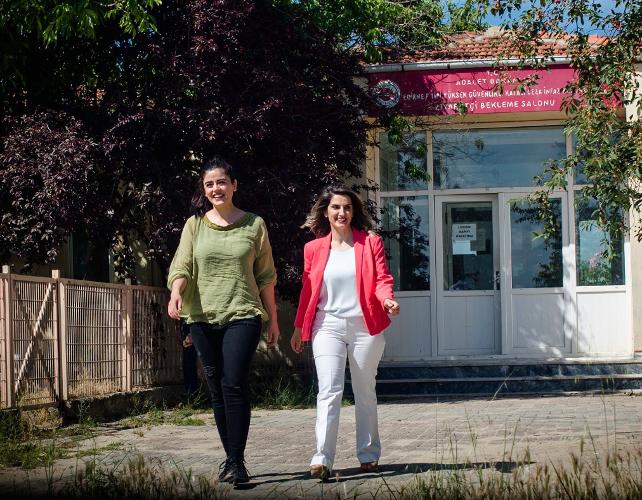
In fact, Başak’s eyes were shining plenty on going in, but they were seemingly even brighter on exiting.
We are in the car again. Are we tired? Are we to sleep?
Fat chance. Both Başak and Bahar are full of beans. In fact, they appear to be more energetic than they were in the morning. Bahar speaks of conversations on the WhatsApp group set up among the siblings. Başak’s first task is to call Selahattin’s mum. “Mummy, your son is very well,” she says, “He is healthy, hopeful and kisses your hands.” Countryside again, motorway again, traffic again.
“I do not dramatize this thing that has happened to us too much. I do not put it across like this to the children, either. People live through such hardship in the world. Regardless of their political views, there are those who come on visits under much harsher conditions than me or who cannot come, and I empathise with them. I think that Selahattin being in prison is a great injustice, but he is actually in a very good position just now. I sensed from the very outset that he was destined for great things. I never imagined he would stand for president. But it was clear from the outset that he would be a very good lawyer, he would be a very good human rights volunteer and he would be a very good person.”
19.20 FLIGHT FROM ISTANBUL TO DİYARBAKIR We are on the plane again. The last stage of the return journey. The sun will set while we are in the air. And the full moon left over from yesterday will light the sky. Başak will speak of Selahattin again on the way.
She is annoyed that he was denied permission to phone in to the programme on Fox TV in the evening. “How scared they are at him speaking,” she says. “They threw him in jail and that was not enough,” she says. “That’s how it is. He’s a good orator so of course they’ll be scared,” she says.

As the plane crosses the country diagonally from one full end to another end and the sun sets and everywhere sinks into darkness, we are talking about the sun that will rise. We are talking about time. We are talking about the future.
Başak is put out by the concerns that grip me and finally rebels, saying, “Instead of thinking about this, taste these hopeful times, will you?” I am not sure how far concern and hope are from one another. But thinking realistically and hope are very close to one another, of that I am sure. We speak a bit about reality and a bit about dreams. But, she wants to speak about hope the most, does Başak. About the hope that keeps her and all those around her going.
“It was clear from the outset that we would not live like normal people. This was always closely related to politics. He was in the opposition. It could be guessed that this opposition stance of his would land him in such a position in this country. Because, there was a whole people for whom he had assumed responsibility and that peoples problems have always been our problems, too.”
22.30 RETURN HOME

The youngest girl Dilda greets Başak at the door on her return home from Edirne in the evening. They hug for ages.
The youngest girl Dilda opens the door. Their big girl Delal is at her friend’s to prepare for exams. Dilda keeps on hugging her mum. Her mum whispers nice things into her ear. She tells her how her dad is fine. They whisper a bit more to each other. They hug one another a bit more.
Then they pass into the kitchen. The cups we drank coffee from in the morning catch my eye. I cannot believe that we have been 1700 kilometres and back in sixteen hours from this home we left this morning and have entered this evening. Life tells people that distance, like time, is relative. Life tells people plenty of things.
Başak has brewed tea and is still patiently speaking to me of hope and how we will see good days before long.
We are drinking tea.
To hope and good days. Forever and all together.
Archive of Turkish press translations by Tim Drayton